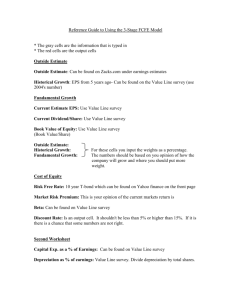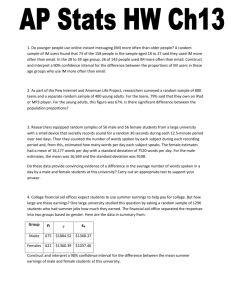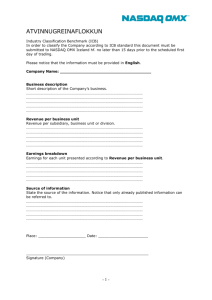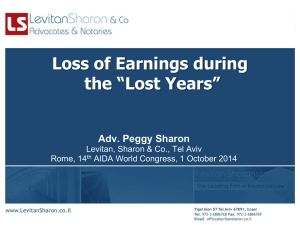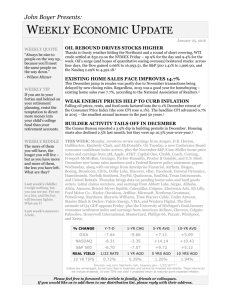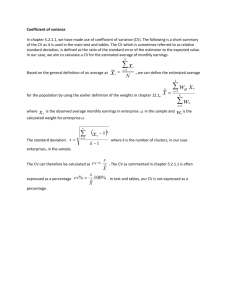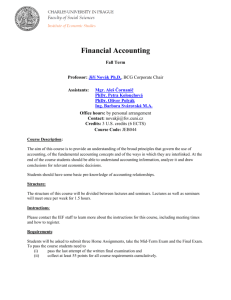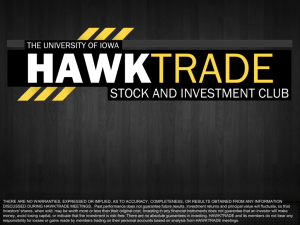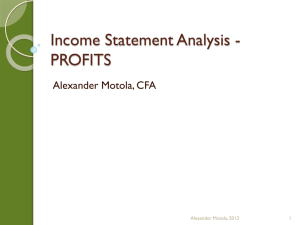Good Business - WordPress.com
advertisement
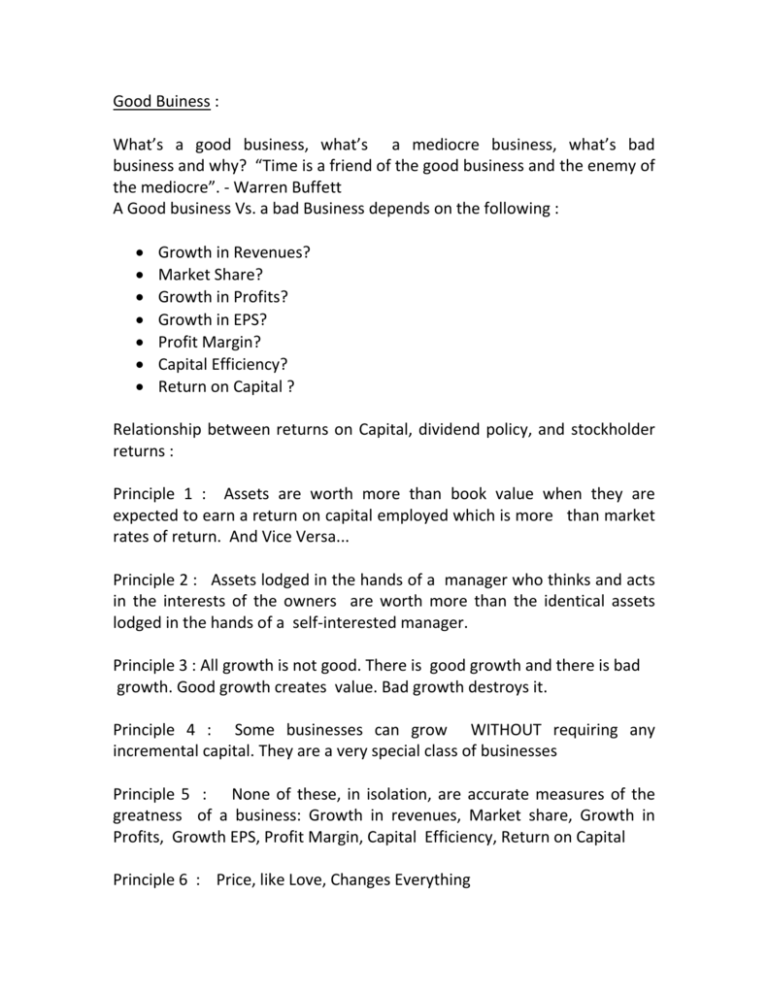
Good Buiness : What’s a good business, what’s a mediocre business, what’s bad business and why? “Time is a friend of the good business and the enemy of the mediocre”. - Warren Buffett A Good business Vs. a bad Business depends on the following : Growth in Revenues? Market Share? Growth in Profits? Growth in EPS? Profit Margin? Capital Efficiency? Return on Capital ? Relationship between returns on Capital, dividend policy, and stockholder returns : Principle 1 : Assets are worth more than book value when they are expected to earn a return on capital employed which is more than market rates of return. And Vice Versa... Principle 2 : Assets lodged in the hands of a manager who thinks and acts in the interests of the owners are worth more than the identical assets lodged in the hands of a self-interested manager. Principle 3 : All growth is not good. There is good growth and there is bad growth. Good growth creates value. Bad growth destroys it. Principle 4 : Some businesses can grow WITHOUT requiring any incremental capital. They are a very special class of businesses Principle 5 : None of these, in isolation, are accurate measures of the greatness of a business: Growth in revenues, Market share, Growth in Profits, Growth EPS, Profit Margin, Capital Efficiency, Return on Capital Principle 6 : Price, like Love, Changes Everything Measures of Economic Performance : “Most companies define “record” earnings as a new high in earnings per share. Since businesses customarily add from year to year to their equity base, we find nothing particularly noteworthy in a management performance combining, say, a 10% increase in equity capital and a 5% increase in earnings per share.” “After all, even a totally dormant savings account will produce steadily rising interest earnings each year because of compounding.” “The primary test of managerial economic performance is the achievement of a high earnings rate on equity capital employed (without undue leverage, accounting gimmickry, etc.) and not the achievement of consistent gains in earnings per share.” “In our view, many businesses would be better understood by their shareholder owners, as well as the general public, if managements and financial analysts modified the primary emphasis they place upon earnings per share, and upon yearly changes in that figure.” Buffet on Best Businesses : “Leaving the question of price aside, the best business to own is one that over an extended period can employ large amounts of incremental capital at very high rates of return” “The worst business to own is one that must, or will, do the opposite - that is, consistently employ ever-greater amounts of capital at very low rates of return.” “The business is wonderful if it gives you more and more money every year without putting up anything – or by putting up very little. And we have some businesses like that. A business is also wonderful if it takes money, but where the rate at which you re-invest the money is very satisfactory.” Earnings Per Share = Asset turnover * Return on sales *Leverage *Book Value Per Share EPS = ( Sales / Assets ) * ( Net Profit / Net Sales )*(Assets / Networth )*( Net worth / No. of Shares Outstanding ) “Time is a friend of the good business and the enemy of the mediocre” Why? Importance of Earnings Retention Buffett’s Equation: Value of Firm = Value of Net Tangible Assets + Economic Goodwill “Businesses logically are worth far more than net tangible assets when they can be expected to produce earnings on such assets considerably in excess of market rates of return. The capitalized value of this excess return is Economic Goodwill.” Buffett on Best Businesses “The worst business of all is the one that grows a lot, where you’re forced to grow just to stay in the game at all and where you’re reinvesting the capital at a very low rate of return.” Shareholder: Did you have a particular business or investment experience early in your career which convinced you it was preferable to invest in high quality businesses? Or was it simply a matter of analyzing the effect of owning a high quality growing company over a long term? ”You should seek businesses that just drown in money if they just pause for breath…” Questions to ask: Why is this company earning high returns on capital? Answer lies in the the du-pont formula : High margins and high capital turnover (low capital intensity) High margins and low capital turnover (high capital intensity e.g. shipping) Low margins and high capital turnover e.g. Wal-mart, But see what happened to IBP Moats “What we’re trying to find is a business that for one reason or another – because it’s the low cost provider in some area, because it has a natural franchise due to its service capabilities, because of its position in the consumer’s mind, because of a technological advantage or any kind of reason at all – has this moat around it. “However all moats are subject to attack in a capitalistic system. If you have a big castle out there, people are going to try to figure out how to get to it. And most moats aren’t worth a damn in capitalism.” “And we try to figure out why the castle is still standing and what’s going to keep it standing or cause it not to be standing five, ten, or twenty years from now. What are the key factors? How permanent are they? And how much do they depend on the genius of the lord in the castle?” The Franchise-Business Continuum Weak Business Weak Franchise/Strong Business Strong Franchise What to look for in a great business? A high return on capital (not contributed by a very low margin operation where margins could fall) which is sustainable - pricing power, low cost advantage etc. Ability to deploy incremental capital at high rates of return i.e. growth prospects. (Why this ability is crucial?) Ability to self-fund growth (How important is dilution?) What to look for in a bad business? A low return on capital Growth (what does high growth do to bad business?) Inability to self-fund growth (with consequential effects on quality of balance sheet) Very Important Lesson : "If a business earns 18% on capital over twenty or thirty years, even if you pay an expensive looking price, you'll end up with one hell of a result." Charlie Munger
